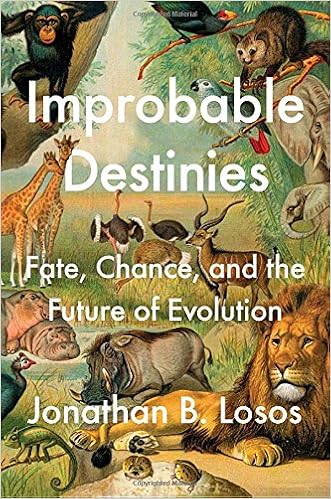From Jonathan B. Losos, author of Improbable Destinies: Fate, Chance, and the Future of Evolution at Nautilus:
Is convergence pervasive, a demonstration of inherent structure in the biological world, channeled by predictable forces of natural selection toward outcomes predestined by the environment? Or are examples of convergent evolution the exceptions, cherry-picked illustrations of biological predictability in a haphazard world in which most species have no evolutionary parallels?
We could argue these points back and forth until we’re blue in the face. I’d throw out the platypus, you’d counter with convergent hedgehogs; I’d postulate the unique, algae-encrusted, upside-down-hanging tree sloth, you’d retort with bipedal-hopping mice independently evolved on three continents. And that is how, essentially, this controversy has been debated historically, by compiling lists and telling stories.
Conway Morris and his colleagues are to be commended for bringing convergent evolution to the forefront. We all knew about convergence as a neat trick of natural history, a striking example of the power of natural selection. But Conway Morris and company have made clear that evolutionary duplication is much, much more common than we realized. We now recognize that it’s a frequent occurrence in the natural world, with examples all around us. Still, it’s far from ubiquitous.More.
 The heart of this problem is that so much of what passes for reasoning in evolution today, controlled by Darwinians, is merely a tautology: natural selection, as above, is a good example. It means survival of the fittest and we know who the fittest are because they survived. And thus convergence is “a striking example of the power of natural selection.”
The heart of this problem is that so much of what passes for reasoning in evolution today, controlled by Darwinians, is merely a tautology: natural selection, as above, is a good example. It means survival of the fittest and we know who the fittest are because they survived. And thus convergence is “a striking example of the power of natural selection.”
Of course! Given that natural selection is a tautology, anything, everything, and nothing is an example of its power.
The casuistries employed to protect the tautology from being identified and treated as such are breathtaking and they have certainly gotten in the way of understanding evolution. Which is convenient if one wants to write an elegant essay about evolution without really starting anything or getting centred out.
If we had enough information about how evolution works, we would probably find ourselves in the position that neither school of thought can ever be dogma, only interpretation. In the same way, historians argue over whether there are laws that govern human history or merely patterns it falls into, or just chaos. Or a bit of all of them.
See also: Convergence or parallelism?: Kevin Padian at Nature on Jonathan Losos’ Improbable Destinies
New book: Evolution happens more quickly than we think
and
Evolution: The fossils speak, but hardly with one voice